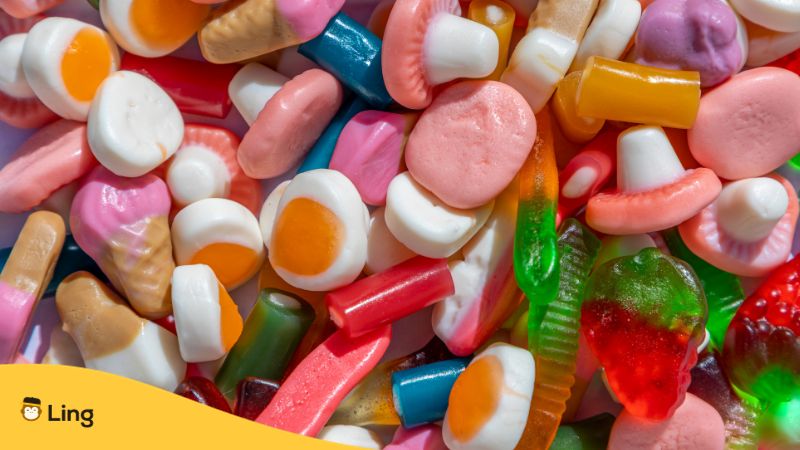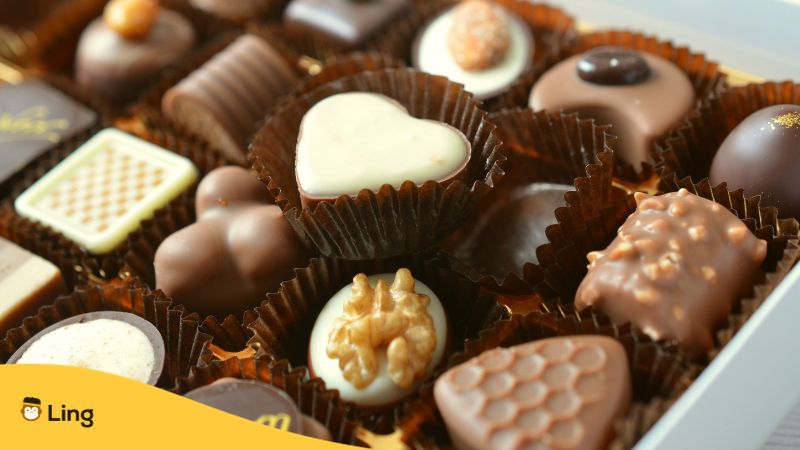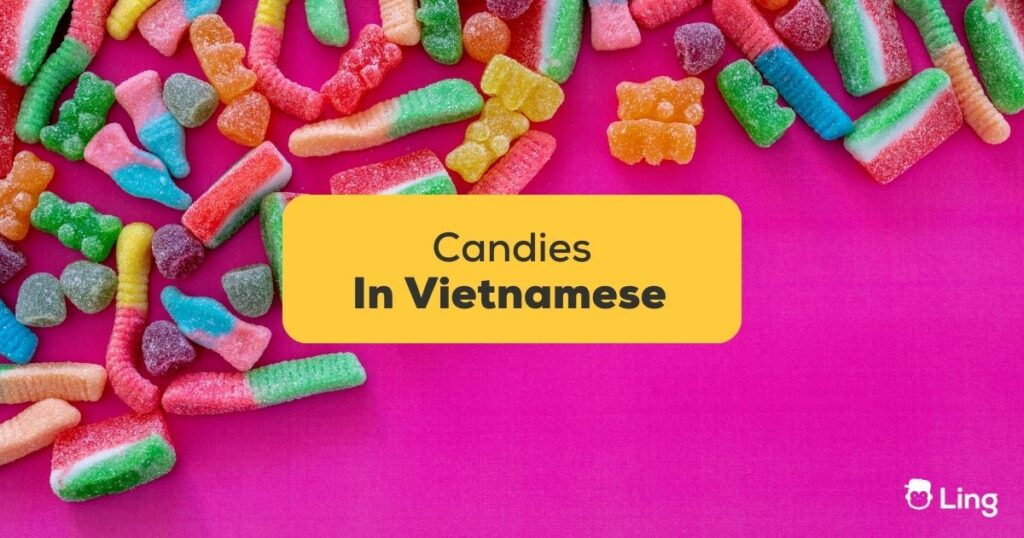Candies translate to “kẹo,” “cục kẹo,” or “bánh kẹo,” which you will first learn when looking for Vietnamese words for candies. Popular types include “kẹo dẻo” (chewy candies) and “kẹo caramen” (caramel candies). These sweets blend flavors, reflecting the country’s culinary diversity. Salivating with all these “sweet” talks yet? Well, you’re in for a treat (pun intended)! In this article, we’ll go over the common words related to candies in this Asian language. Let’s begin!
Candies (cục kẹo) hold a special place in Vietnam’s culture and traditions. With this said, it’s important to remember that learning words related to food and snacks allows you to explore local delicacies, understand menus at local eateries, and engage in food-related conversations. So if you’re planning to stay in Vietnam for a short while, we highly recommend that you master even the common words for candies because it’ll help you gain more insights about what the locals like and dislike.

Essential Vietnamese Words For Candies
In this section, we’ll present a selection of commonly used Vietnamese words for various types of “cục kẹo,” complete with phonetic pronunciation guides and example sentences to sweeten your language learning and practice.
Common Types Of Candies In Vietnamese
Here are the common terms used to refer to candy in Vietnamese and their definitions:
- Bánh Kẹo (Bun Kay-oh) – This term is a general term for Vietnamese cục kẹo candy, sweets, and candy bars.
- Kẹo Dẻo (Kay-oh Deh-oh) – Translating to “chewy candy,” kẹo dẻo can refer to a wide range of chewy treats, including taffy and gummy candies.
- Kẹo Bơ (Kay-oh Buh) – Vietnamese coconut candies that are creamy and coconutty goodness.
- Mứt (Moot) – Mứt refers to candied fruits, often enjoyed during special occasions like the Lunar New Year. Try “Mứt Dừa” for candied coconut or “Mứt Táo” for candied apples.
- Kẹo Hạt Điều (Kay-oh Hat Dee-oo) – It’s cashew nut candy, typically coated in caramelized sugar.
- Kẹo Lollipop (Kay-oh Lolly-pop) – Sometimes, candy words are borrowed from English, like “lollipop.” Pronunciation remains similar, but you’ll impress locals by using the Vietnamese term.
- Sô Cô La (So Koh-lah) – This is the Vietnamese term for “chocolate.”
- Kẹo Bánh Mì (Kay-oh Bun Mee) – Not to be confused with bread (bánh mì), this candy term refers to sweet, baked goods, such as pastries and biscuits.
Having some trouble pronouncing those candy types? Here are phonetic guides to help you master the sweet sounds of cục kẹo candy vocabulary:
- “Kẹo” sounds like “Kay-oh,” with a soft “k” and a rising tone.
- “Mứt” is pronounced as “Moot,” with a flat tone.
- “Sô Cô La” is simply “So Koh-lah,” echoing the English pronunciation.
- “Kẹo Bánh Mì” is “Kay-oh Bun Mee,” maintaining the soft “k” sound.

Sentences Using Words Related To Cục Kẹo Candy
To truly master these words, let’s place them in context with some example sentences:
I want to buy a lollipop, please, thank you!
Vietnamese translation: “Tôi muốn mua một cái kẹo lollipop, xin cảm ơn!”
When making a simple purchase request in Vietnamese, politeness is often emphasized by adding words of gratitude. The desire for an item, like a lollipop in this case, is stated upfront, and it’s customary to say ‘thank you’ as part of the request.
I like coconut candy more than chocolate candy.
Vietnamese translation: “Em thích kẹo bơ hơn kẹo sô cô la.”
In Vietnamese, when comparing preferences between two things, the structure “thích…hơn…” (like…more than…) is utilized. Here, the preference for coconut candy over chocolate candy is made clear.
On Lunar New Year, my family often makes candied apples and candied coconut.
Vietnamese translation: “Ngày Tết, gia đình tôi thường làm mứt táo và mứt dừa.”
The Lunar New Year, often referred to as “Tết,” is a significant holiday in Vietnam. During this time, families prepare traditional candied fruits and sweets. The phrase mentions two popular treats made during this festive season.
Do you like chewy candies?
Vietnamese translation: “Cậu có thích kẹo kẹo dẻo không?”
Questions about personal preferences are common in Vietnamese, much like in English. Here, the inquiry centers around the texture of the candy, specifically whether someone likes the chewy kind.
Candies’ Role In Vietnamese Holidays And Festivals
Holidays and festivals in Vietnam are brimming with locals cooking meals and delicacies. They also serve “cục kẹo” for desserts or individually wrapped for children and craving adults:
Lunar New Year (Tết)
Tết is the most significant celebration in Vietnam. Candies, especially Mứt Tết, are prepared in abundance to welcome guests and share good fortune. Visitors are often greeted with trays of sweets and tea upon arrival.
Mid-Autumn Festival (Tết Trung Thu)
This festival celebrates the harvest season, and mooncakes are a central element. Mooncakes are filled with sweet ingredients like lotus seed paste or mung bean paste, showcasing the Vietnamese tendency to combine sweet flavors with cultural celebrations.
Weddings
Candies, such as Bánh Phu Thê, are shared with guests as a gesture of gratitude and as a symbol of the couple’s commitment to each other.
Learn Vietnamese With Ling
Ready to sweeten your language learning process and indulge your curiosity for both culture and confectionery? As you know by now, learning a new language doesn’t stop when you have already mastered how to pronounce candy. It’s best if you have a handy companion to help you in the process – introducing Ling.
With Ling, you can make learning Vietnamese as enjoyable as munching on candies. This language learning app, available on both the Play Store and App Store, offers a playful array of interactive activities and games that transform language acquisition into a delightful adventure. So why wait? Take a sweet step towards mastering Vietnamese (and many other foreign languages) and satisfying your linguistic cravings.


































































